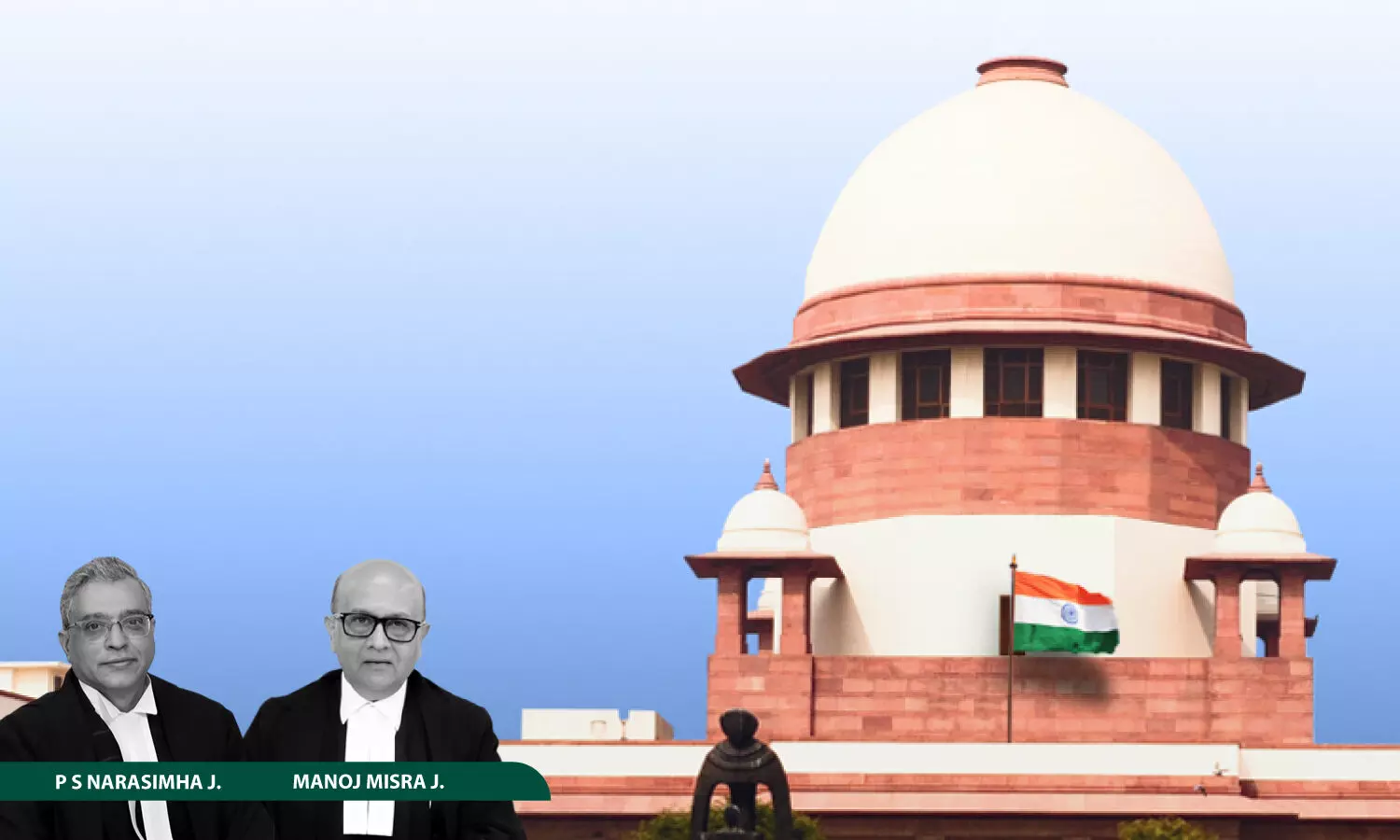
Justice Pamidighantam Sri Narasimha, Justice Manoj Misra, Supreme Court
Any Agreement Or Clause Contemplating Further Consent Before Reference To Arbitration Is Not An Arbitration Agreement: Supreme Court
 |
|The appeal before the Supreme Court was filed against the order whereby the application under Section 11 of the Arbitration and Conciliation Act, 1996, was dismissed on the ground of non-existence of an arbitration agreement.
The Supreme Court has upheld an order dismissing an application seeking appointment of an Arbitrator and observed that any agreement, or clause in an agreement, requiring or contemplating a further consent or consensus before a reference to arbitration, is not an arbitration agreement.
The appeal before the Supreme Court was filed against the order whereby the application under Section 11 of the Arbitration and Conciliation Act, 1996, was dismissed on the ground of non-existence of an arbitration agreement between the parties.
The Division Bench of Justice Pamidighantam Sri Narasimha and Justice Manoj Misra observed, “Similarly, a clause which states that "if the parties so decide, the disputes shall be referred to arbitration" or "any disputes between parties, if they so agree, shall be referred to arbitration" would not constitute an arbitration agreement. Because such clauses merely indicate a desire or hope to have the disputes settled by arbitration, or a tentative arrangement to explore arbitration as a mode of settlement if and when a dispute arises. This is so, because such clauses require the parties to arrive at a further agreement to go to arbitration, as and when disputes arise. Therefore, any agreement, or clause in an agreement, requiring or contemplating a further consent or consensus before a reference to arbitration, is not an arbitration agreement.”
Advocate Shubhabrata Dutta represented the Appellant while AOR R. Venkat Prabhat represented the Respondent.
Factual Background
The appellant and the respondent entered into a contract relating to the transportation/handling of goods. Disputes arose between the parties during the subsistence of the contract. The case revolved around the interpretation of Clause 13 of the General Terms and Conditions, appended to the e-tender notice. Treating a portion of clause 13 as an arbitration agreement, the appellant filed an application under Section 11(6) of the 1996 Act for the appointment of an Arbitrator for the settlement of the disputes inter se the parties.
The respondent objected to the prayer for appointment of an Arbitrator on the ground that clause 13 was bereft of the essential ingredients to constitute an arbitration agreement and therefore, the application seeking the appointment of an Arbitrator deserved rejection. The High Court accepted the objection and dismissed the application. The High Court referred to clause 13 and held that where the word “may” is used there is no clear intention of the parties to refer the dispute between them to arbitration. It was in such circumstances that the appeal came to be filed before the Apex Court.
Reasoning
Referring to the judgment in Interplay Between Arbitration Agreements under Arbitration, 1996 & Stamp Act, 1899, In re(2024), the Bench said, “What can be deduced from the above decision is that the Referral Court before appointing an arbitral tribunal will have to be prima facie satisfied that an arbitration agreement as contemplated in Section 7 of the 1996 Act exists. For this limited purpose it can scrutinize the documents relied upon by the parties in proof of its existence. Though the burden of proving the existence of arbitration agreement lies on the party seeking to rely on such agreement, only prima facie proof of its existence must be adduced before the Referral Court because the Referral Court is not the appropriate forum to conduct a mini-trial by allowing the parties to adduce the evidence in regard to its existence.”
The Bench also added, “... where the professed arbitration agreement is not contained in any one document and is to be inferred from two or more documents, such as exchange of letters or communications, parties may raise various pleas and place various documents to prove or disprove its existence. In such a scenario, if from the documents placed, existence of an arbitration agreement, as defined in Section 7, is prima facie made out, Referral Court, instead of undertaking a deeper probe or inquiry, should refer the matter to the arbitral tribunal. More so, because opinion of the Referral Court as to existence of an arbitration agreement is neither binding on the arbitral tribunal nor the Court dealing with the arbitral award.”
Coming to the facts of the case, the Bench noted that the High Court opined that use of the words “may be sought through Arbitration…” indicate that at the stage of entering the contract, parties were not ad idem that inter se dispute shall be resolved through arbitration, therefore the said clause would not constitute an arbitration agreement. The Bench observed that clause 13 does not bind parties to use arbitration for the settlement of disputes. Use of the words “may be sought”, imply that there is no subsisting agreement between parties that they, or any one of them, would have to seek settlement of disputes through arbitration. It is just an enabling clause whereunder, if parties agree, they could resolve their disputes through arbitration.
“In our view, the phraseology of clause 13 is not indicative of a binding agreement that any of the parties on its own could seek redressal of inter se dispute(s) through arbitration. We are, therefore, of the considered view that the High Court was justified in holding that clause 13 does not constitute an arbitration agreement”, it said.
Thus, the Bench dismissed the appeal.
Cause Title: BGN and M-RPL-JMCT(JV) v. Eastern Coalfields Limited (Neutral Citation: 2025 INSC 874)
Appearance
Appellant: Advocates Shubhabrata Dutta, Sunando Raha, Subhojit Seal, Sk Sayan Uddin, Vikalp Gupta, Shruti Bist, Anna Oommen, AOR Kunal Malik, Advocates Akash Singh Rana, Piyush Malik
Respondent: AOR R. Venkat Prabhat, Advocate Daksh Pandit